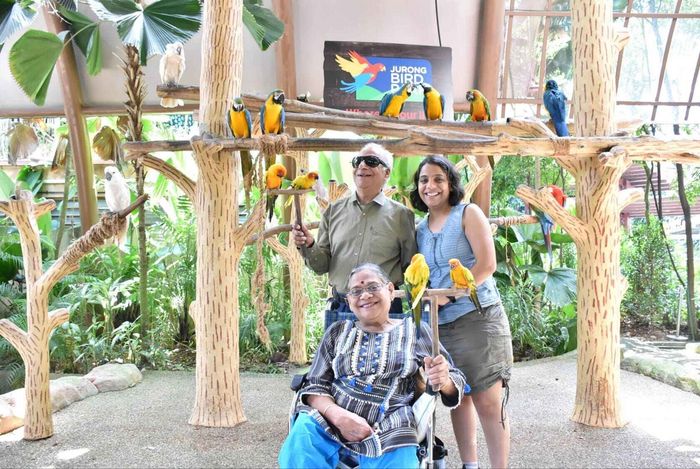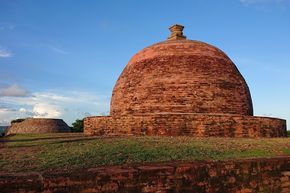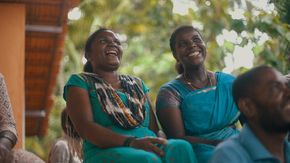by Neha Arora
Imagine you are a wheelchair user and visit a 1000-year-old heritage building, only to find that you cannot see it from inside because there is only a flight of stairs leading to it. Or imagine being hard of hearing or deaf and not being able to communicate with your guide, while the product you booked does at least have a wheelchair-accessible bathroom.
For people with disabilities and their relatives, travelling can be exhausting and challenging. Including friends and family, this applies to more than 25 percent of the world population. My mother is a wheelchair user and my father is blind and uses hearing aids due to age-related hearing loss. Recently, he has been diagnosed with Parkinson’s as well. Having never been on a holiday as a child and my parents never having been on one until a few years ago hit me hard.
After I started working and saved money we went for our first family holiday. Only then did I realise that not so much the affordability of travel, but the lack of information about accessibility at the destination, physical infrastructure, inaccessible communication channels, zero digital accessibility and societal stigma and prejudice were the real issues. No one seems to expect people with disabilities to travel, assuming they don’t work and don’t have money.
Motivation to act
I wanted to change that perception and create solutions, and I wanted to convince myself that this could be a financially viable business idea. So, I started my research which included sitting at multiple airports to count the number of travellers with disabilities coming through. I was starting from my home country, India, and was perhaps on the road to becoming the least travelled travel company owner.
Other accessible travel companies I found online were usually single disability-focused, which for me made little sense. If your disability decides who you travel with, when you travel and where, it is discrimination again. Why shouldn’t a person with one or more disabilities have the freedom of choice when it comes to travelling?
The inclusive model
So, Planet Abled was born. From the very first trip, we mix people with various disabilities and non-disabled to travel together in all our group tours. And the impact it has is something even I had never imagined. Many of our tour participants became friends. Some came back to us saying they want to make their office accessible and hire people with disabilities. A non-disabled traveller told us that they had been to the destination before, but as a travel buddy to a disabled co-traveller they experienced it in a new way. One blind man who was not able to communicate with a deaf girl on one of the trips even started to create a mobile app that could turn signs into speech and speech into signs. Suddenly, tourism became a medium for change in the community.
How we do it
I want to mainstream accessibility and inclusion in the tourism industry in my lifetime. All the industry needs is proper preparation and training and transparent information sharing. Having started our work in India we now operate internationally and have an office in Vienna as well.
Destination development includes auditing the destination for accessibility status of diverse accessibility needs, training the staff, guides, drivers and stakeholders at all touch points of a travellers’ journey and helping them improve their accessibility. Also to mention some bit of lobbying we do on the side with the authorities.
Over the years, we have not just been limited to leisure travel, we have also catered to international para sports teams, Nobel laureates, paralympians and conference participants for their travel services and logistics. Accessible travel comes in all shapes and sizes.
Consultation at the United Nations in Vienna
To dig deeper into why people with disabilities continue to have unpleasant experiences while travelling, Planet Abled did a stakeholder consultation at the United Nations in Vienna in 2023. The most significant finding was that there is a wide gap between what an organisation considers accessible meeting all compliances and the expectations and needs of a traveller with a disability. As an industry, we need to work towards reducing this gap.
Making accessibility mainstream
To make that happen, Planet Abled consults, trains and certifies tourism stakeholders. This also includes the monitoring of impact metrics over a period of time so that there are achievable benchmarks for their return on investment in accessibility. Internal accessibility leaders are being identified to carry the baton forward within the organisations.
The tourism industry does not need separate travel companies for disabled people. We will have to mainstream accessibility so that people with disabilities have the freedom of choice, there is ready accessibility information available, and there is quality of service by real intention and not just compliance.
Having mapped accessibility and inclusion in tourism to seven out of 17 sustainable development goals (SDGs), we cannot have a conversation about sustainable tourism and not talk about accessibility. Each one of us is likely to be impacted by disability at some point in our lives, whether it is by birth, through accident, due to a medical condition, or in old age. This may include disabilities such as chronic pain, long-covid, dementia or depression which come with additional problems because of their invisibility.
If we want to see real change and enable people with disabilities to travel as seamlessly as any non-disabled person, we have to work together on this inclusive model. We need to turn accessible travel from being an apprehension for tourism businesses to being an aspiration and compete with each other on who has a better service delivery.
Neha Arora, founder of Planet Abled, pioneers inclusive travel for persons with disabilities and the elderly. She is the winner of the TODO Award Human Rights in Tourism 2025.
The award ceremony for the TO DO Award at ITB Berlin will take place on 5 March 2025 at 6 pm on the eTravel stage in hall 6.1.
Other ITB events with Neha Arora:
Panel Discussion “Travelling Together: Embracing Inclusivity for Industry Growth” on 4 March 2025 at 11.45 a.m. on the green stage in Hall 7.1b.
BMZ and UN Tourism Special Session: “Breaking Barriers. Pathways to Inclusive Employment and Accessible Tourism” on 5 March 2025 at 4 pm on the blue stage in Hall 7.1b.




